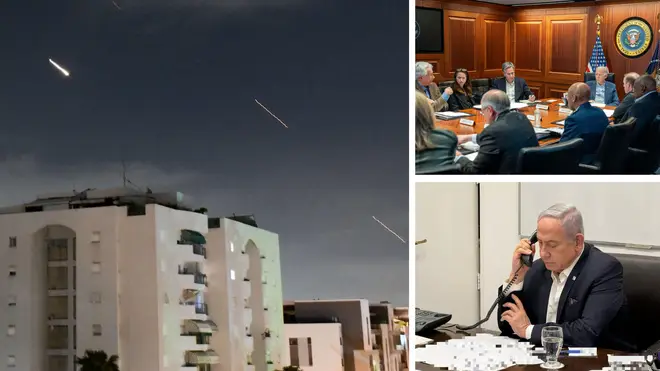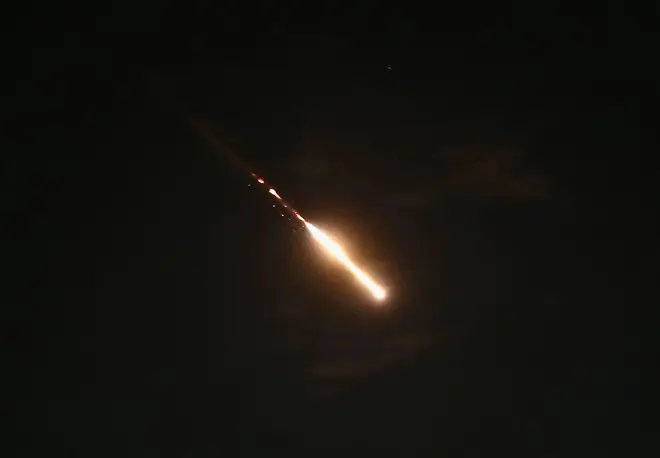
Dom Joly 3pm - 6pm
14 April 2024, 18:31 | Updated: 14 April 2024, 19:40

The leaders of the G7 group of countries have condemned Iran for its "unprecedented" attack on Israel, and said they are prepared to "take further measures" to avoid further destabilisation of the region.
The US, the UK, Germany, France, Canada, Italy, Japan and the EU expressed their "full solidarity and support to Israel" after Iran launched a huge attack overnight.
Israel said after a meeting of its war cabinet that it had approved "operational plans for both offensive and defensive action".
They said in a statement: "We, the Leaders of the G7, unequivocally condemn in the strongest terms Iran’s direct and unprecedented attack against Israel. Iran fired hundreds of drones and missiles towards Israel. Israel, with the help of its partners, defeated the attack.
"We express our full solidarity and support to Israel and its people and reaffirm our commitment towards its security.
"With its actions, Iran has further stepped toward the destabilization of the region and risks provoking an uncontrollable regional escalation. This must be avoided.
Read more: RAF jets shot down ‘a number’ of Iranian drones attacking Israel, Rishi Sunak says

IDF Spokesperson Peter Lerner tells Iain Dale how Israel 'worked very hard' to save lives
"We will continue to work to stabilize the situation and avoid further escalation. In this spirit, we demand that Iran and its proxies cease their attacks, and we stand ready to take further measures now and in response to further destabilizing initiatives.
"We will also strengthen our cooperation to end the crisis in Gaza, including by continuing to work towards an immediate and sustainable ceasefire and the release of hostages by Hamas, and deliver increased humanitarian assistance to Palestinians in need."
Air raid sirens were sounded across Israel to warn civilians of the threat from above after the Israel Defense Force (IDF) warned of the incoming assault at 11pm local time (9pm BST).

Former UK Ambassador there needs to be a 'process that enables the Iran conflict to come to an end'
In an update on Sunday morning, Israeli military spokesman Rear Admiral Daniel Hagari said that more than 300 weapons had been fired by Iran, 99% of which were intercepted.
He said few of the missiles reached Israel, after Iran fired 170 drones, more than 30 cruise missiles and more than 120 ballistic missiles.
He described the country’s interception mission as “a very significant strategic success”.
While few of the missiles reached Israel, a seven-year-old girl was critically injured in the south of the country and an army base was lightly damaged.
Later on Sunday, an Israeli war cabinet minister said the country's conflict with Iran is "not over" and vowed that his country would respond to Iran’s attack when the "timing is right" after it intercepted over 300 drones and missiles on Saturday night.

Benny Gantz said Israel would "collect a price" for Iran's strike, which came in response to what Iran claimed was a deadly attack on its embassy in Syria.
In a statement ahead of an Israeli war cabinet meeting on Sunday, Mr Gantz said: "Yesterday, Iran launched an attack on Israel - and met the strength of the Israeli security system."
He added: "This event is not over - the strategic alliance and the regional cooperation system that we built and stood its significant test need to be strengthened precisely now."
Mr Gantz said: "Faced with the threat of Iran - we will build a regional coalition and collect the price from Iran, in the way and at the time that suits us."

The US has urged Israel to restrain itself from retaliating to Iran's attack to avoid escalating the conflict. Tehran has said it would respond to any fightback from Israel.
Joe Biden has reaffirmed the US' "ironclad" support for the defence of Israel, but a national security spokesperson has said it would not take part in any attack on Iran.
"We don't seek escalated tensions in the region. We don't seek a wider conflict," John Kirby said.
The US, UK, France and Jordan all assisted in the response to the attack, with the RAF shooting down "a number of drones", Rishi Sunak said on Monday.

Ex-Foreign Office Minister says UK will not be 'dragged into' Israel/Iran conflict
His Foreign Secretary David Cameron wrote: "Today I formally condemned in the strongest terms Iran's attack on Israel in a call with Iranian Foreign Minister Amir-Abdollahian.
"I made clear that Iran must stop these reckless attacks, de-escalate and release the MSC Aries [an Israel-affilated ship Iran has seized]."
Lord Cameron also summoned the charge d'affaires of the Iranian embassy to the Foreign Office following Tehran's "profoundly dangerous" attack on Israel, according to a statement from the department.
Sir Mark Lyall-Grant, a former ambassador to the UN, told LBC's Carol Vorderman that the UK participating was unsurprising because "the British government has always been an ally of Israel.
"So it's not surprising that Britain is standing beside Israel after it was attacked by... the atrocities of the terrorist attack by Hamas on October".
Speaking to LBC’s Matthew Wright, former foreign office minister Alistair Burt said the UK is "doing everything it can" to reduce tensions in the region.
He said: “The issue is where this goes from here.
“There is still an opportunity, as many countries are saying in their statements, to reduce this tension by saying to both states we can’t really go on like this, sooner or later, tit for tat goes wrong and then you have a real disaster in the region.”
He continued: “The UK is doing everything it can to warn of an increased risk of escalation, but the United Kingdom's support for the existence of the state of Israel is pretty well unquestioned throughout the UK and the political system, as is the case with the United States.
“By having military activity in the area to defend Israel, making a point to Iran about its activities, but it’s not designed to be aggressive or offensive, it’s designed to say to Iran there are consequences to actions - do not go any further. But I would imagine the private messaging to Israel will also be today: your response to this must be extremely careful, if not to escalate the situation still further.”
More follows.